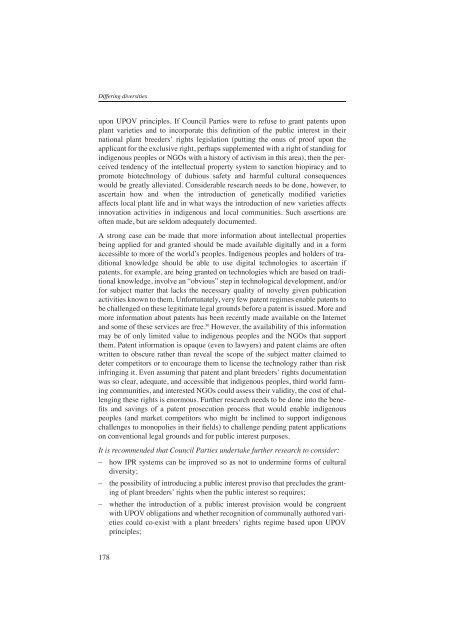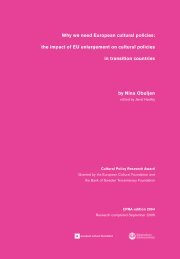Tony Bennett, Differing diversities - Council of Europe
Tony Bennett, Differing diversities - Council of Europe
Tony Bennett, Differing diversities - Council of Europe
You also want an ePaper? Increase the reach of your titles
YUMPU automatically turns print PDFs into web optimized ePapers that Google loves.
<strong>Differing</strong> <strong>diversities</strong>upon UPOV principles. If <strong>Council</strong> Parties were to refuse to grant patents uponplant varieties and to incorporate this definition <strong>of</strong> the public interest in theirnational plant breeders’ rights legislation (putting the onus <strong>of</strong> pro<strong>of</strong> upon theapplicant for the exclusive right, perhaps supplemented with a right <strong>of</strong> standing forindigenous peoples or NGOs with a history <strong>of</strong> activism in this area), then the perceivedtendency <strong>of</strong> the intellectual property system to sanction biopiracy and topromote biotechnology <strong>of</strong> dubious safety and harmful cultural consequenceswould be greatly alleviated. Considerable research needs to be done, however, toascertain how and when the introduction <strong>of</strong> genetically modified varietiesaffects local plant life and in what ways the introduction <strong>of</strong> new varieties affectsinnovation activities in indigenous and local communities. Such assertions are<strong>of</strong>ten made, but are seldom adequately documented.A strong case can be made that more information about intellectual propertiesbeing applied for and granted should be made available digitally and in a formaccessible to more <strong>of</strong> the world’s peoples. Indigenous peoples and holders <strong>of</strong> traditionalknowledge should be able to use digital technologies to ascertain ifpatents, for example, are being granted on technologies which are based on traditionalknowledge, involve an “obvious” step in technological development, and/orfor subject matter that lacks the necessary quality <strong>of</strong> novelty given publicationactivities known to them. Unfortunately, very few patent regimes enable patents tobe challenged on these legitimate legal grounds before a patent is issued. More andmore information about patents has been recently made available on the Internetand some <strong>of</strong> these services are free. 30 However, the availability <strong>of</strong> this informationmay be <strong>of</strong> only limited value to indigenous peoples and the NGOs that supportthem. Patent information is opaque (even to lawyers) and patent claims are <strong>of</strong>tenwritten to obscure rather than reveal the scope <strong>of</strong> the subject matter claimed todeter competitors or to encourage them to license the technology rather than riskinfringing it. Even assuming that patent and plant breeders’ rights documentationwas so clear, adequate, and accessible that indigenous peoples, third world farmingcommunities, and interested NGOs could assess their validity, the cost <strong>of</strong> challengingthese rights is enormous. Further research needs to be done into the benefitsand savings <strong>of</strong> a patent prosecution process that would enable indigenouspeoples (and market competitors who might be inclined to support indigenouschallenges to monopolies in their fields) to challenge pending patent applicationson conventional legal grounds and for public interest purposes.It is recommended that <strong>Council</strong> Parties undertake further research to consider:– how IPR systems can be improved so as not to undermine forms <strong>of</strong> culturaldiversity;– the possibility <strong>of</strong> introducing a public interest proviso that precludes the granting<strong>of</strong> plant breeders’ rights when the public interest so requires;– whether the introduction <strong>of</strong> a public interest provision would be congruentwith UPOV obligations and whether recognition <strong>of</strong> communally authored varietiescould co-exist with a plant breeders’ rights regime based upon UPOVprinciples;178














